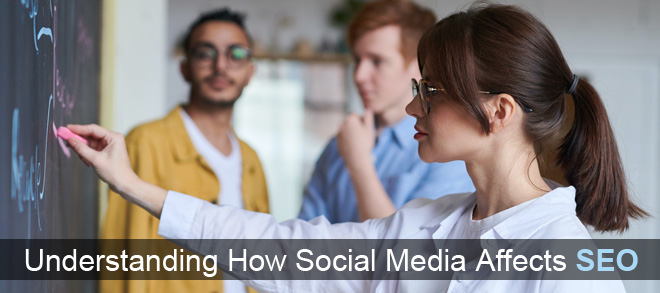
Over the last few years, there’s been a lot of buzz around social media and how it affects search engine optimization. Some believe that social media directly impacts Google rankings, while others consider them two separate entities. For the most part, both of these ideologies are accurate. However, what is very clear is that every business, regardless of size or industry, won’t get very far without SEO and/or social strategy.
Even amidst the differing opinions, an Econsultancy study found that 74% of businesses integrate their social media campaigns with their SEO efforts. Many marketers are conflicted with the impact of SEO because Google’s ranking algorithm hasn’t been exactly clear-cut. In 2010, marketer Danny Sullivan spoke to Google and Bing about the social-SEO effect, and the interview confirmed that there was a direct correlation
Both search engines confirmed that social signals impact ranking. Sullivan stated in an article:
Both Google and Bing tell me that who you are as a person on Twitter can impact how well a page does in regular web search. Authoritative people on Twitter lend their authority to pages they tweet.
However, in one video released by Matt Cutts, a Google webmaster, he stated that metrics related to social media profiles, such as Twitter followers and Facebook fans, have nothing to do with ranking.
The truth of the matter is that while search engines don’t exactly consider your Twitter follower count as indication of your web authority, Google does crawl social links to find relevant information — but not always, and it varies by platform.
Skylar Malley, the CEO at local SEO agency in Denver, says, “It’s important to understand which social media platforms help the most and how each one assists with search engine optimization. Each social media platform has its own benefits and treats content differently.”
Generally speaking, anything that’s posted on the Web, including social posts, is crawlable by Google. For example, if you publish content and link to that content on your social profiles, Google would be able to consider it a credible backlink, and backlinks are important for SEO.
But as Malley indicated, some social platforms, like Twitter, are more index-friendly than others. Furthermore, some Facebook pages actually block Google from crawling it (but this is an easy fix in “Settings” for brands).
Another thing to consider when analyzing the relationship between SEO and social media is that social media profiles appear high in search results — period. During a search for the company Johnson & Johnson, its Facebook page is the third result. During a search for the New York Times, its Twitter and Facebook pages are second and third, right after their website.
In one HubSpot report, titled “The Social Lifecycle” the company found that the majority of surveyed consumers expect the brands they do business with to be on social media.
These consumers not only expect businesses to have social pages, but view them as an indication of “corporate” responsibility. Generally, a person believes a company is more reliable and customer-forward if they are active on social platforms. And if businesses really want to go the extra mile to get their customer’s attention, even Google+ is important: after all, associated Google+ accounts are the first to appear on search engine results pages.
The key takeaway is that businesses should be social on as many platforms as possible. This can be a little frustrating for some, but there are plenty of social media management tools to help you navigate across your different social accounts. Sometimes your social posts will affect your page ranking, and sometimes it won’t, but either way, it only helps to have both in your overall marketing strategy.
Furthermore, although social media isn’t currently directly associated with search engine optimization, it could be in the future. Google is constantly re-analyzing their ranking algorithms, and in the event that they do decide to allow social influence to relate to web presence, you wouldn’t want your business to be late to the party.
Lastly, it’s important to note that social media platforms can behave like search engines all on their own. Twitter, Facebook, YouTube, Instagram, LinkedIn, and Pinterest all have searchable content, and more people are using those avenues to discover it. To stay completely relevant and to grow both online and offline, it’s imperative that you put your business in as many places as you can.
[Images – Main Photo by fauxels from Pexels; other images from their respective websites and/or social platforms]
This has been yet another brilliant Social Media Revolver Sponsored Post. If you would like to get one for your business, please have a look at our Advertising Options.
Comments are closed.